DUBAI: There is no possibility of reaching a truce between Russia and Ukraine and normality can only be achieved after the “annihilation” of the present government in Kyiv, Andrey Baklanov, a Russian diplomat and former ambassador to Saudi Arabia, has said.
Sharing his insights in the latest episode of “Frankly Speaking,” the weekly Arab News current-affairs talk show, Baklanov reckoned a negotiated settlement to the war was unlikely.
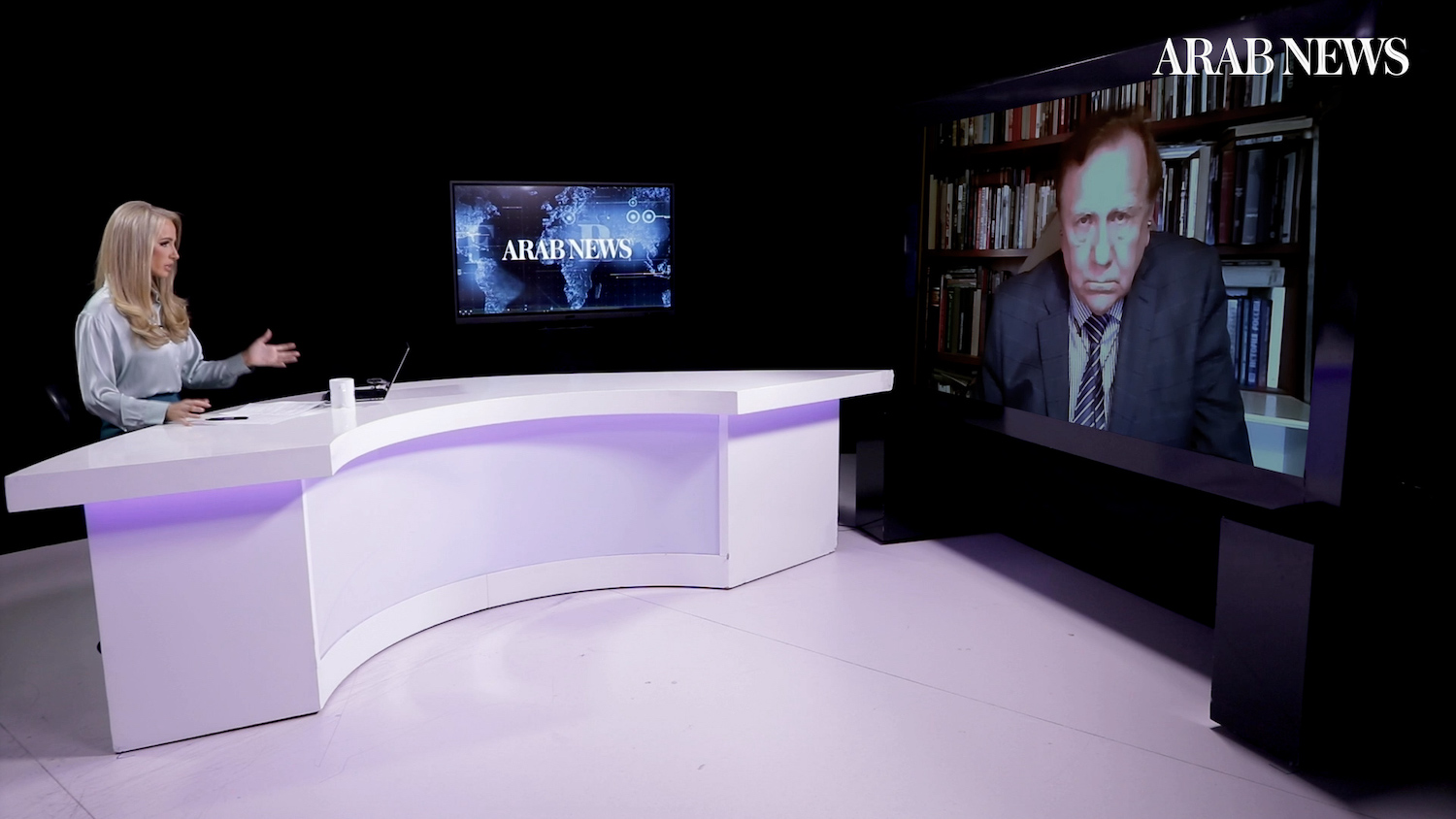
Andrey Baklanov, a Russian diplomat and former ambassador to Saudi Arabia, speaks to Frankly Speaking host Katie Jensen. (AN photo)
“I think that there is no opportunity for any kind of truce between the present-day government — the so-called government, these fascist people in Kyiv — and us,” he added, referring to the government of Ukrainian President Volodymyr Zelensky.
“I’m absolutely sure that the only option we have is to, well, to annihilate this regime in Ukraine and to return Ukraine to normality.”

Ukrainian President Volodymyr Zelensky (R) poses for a selfie with a serviceman during a visit to Donetsk region. (File/AFP)
Besides the Ukraine conflict, the interview touched on issues ranging from the collapse of the Black Sea grain deal and the Wagner Group to Russia’s relations with Syria and the Chinese-brokered Saudi-Iran normalization deal.
Baklanov noted that Russia’s aims in Ukraine remained unchanged.
“The first, denazification; second, demilitarization; and third, the termination of the criminal activities of the criminal regime, which had a coup d’etat in 2014,” he said, referring to the protests that removed pro-Russian leader Viktor Yanukovych from power that year.
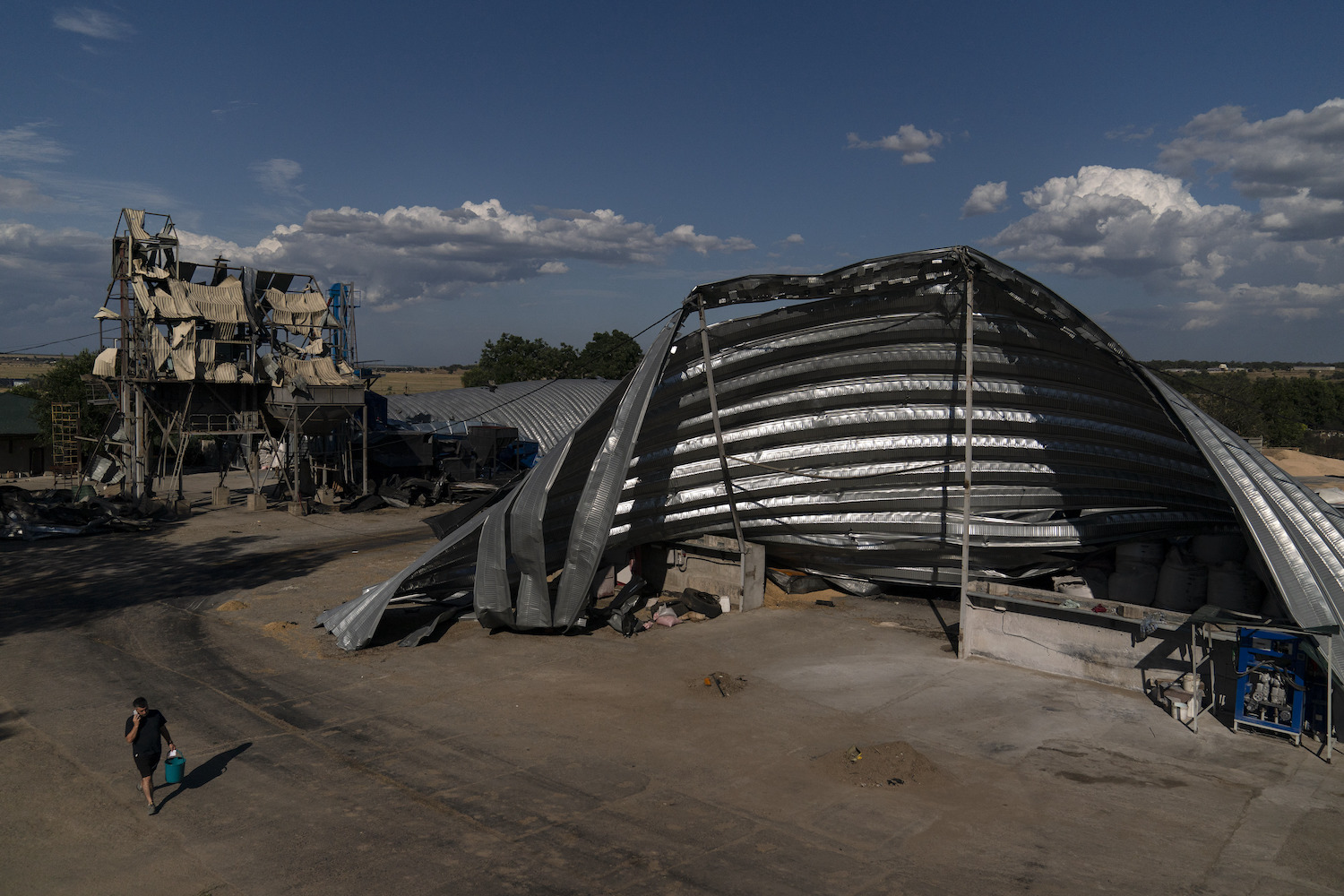
An employee walks near mangled warehouses at a grain facility in Pavlivka, Ukraine, Saturday, July 22, 2023, following Russian missile attacks. (File/AFP)
Although the Russian claim that Ukraine is controlled by a fascist clique has been vigorously contested, Baklanov drew on events of World War II to justify the “special military operation” launched against Ukraine 18 months ago.
“We regard what was going on in Ukraine as the prolongation of the Second World War,” he added.
In the present situation, he described Zelensky as a “traitor” who, together with “many other of the criminals, will be answering in our court for the criminal activities during the eight or even nine years against our people in Donbas. They will be caught and will be imprisoned.”
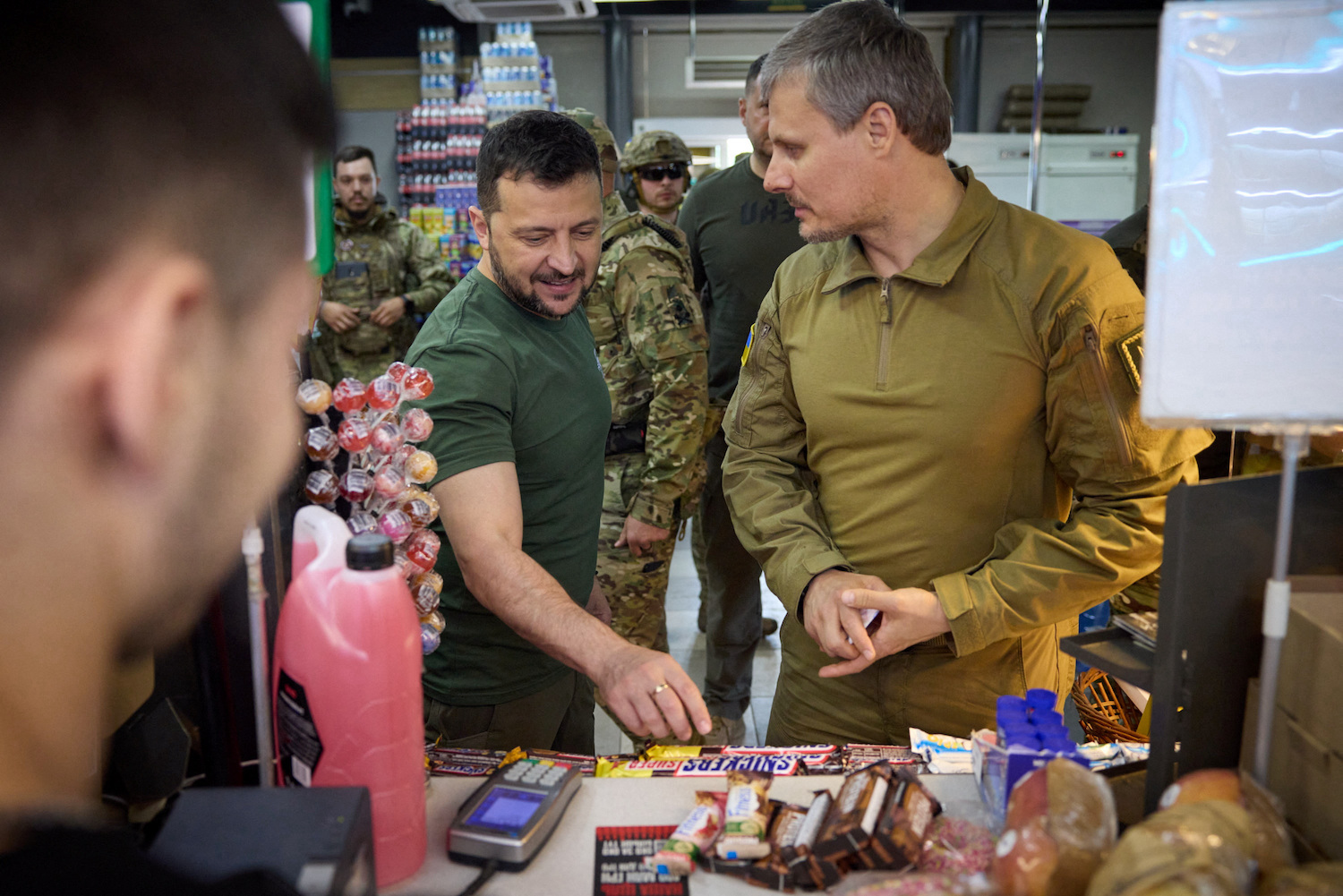
Ukrainian President Volodymyr Zelensky (L) buys an ice cream during a visit to the Donetsk region. (File/AFP)
Baklanov also used the interview to defend Russia’s decision to scrap a UN- and Turkiye-brokered agreement that had allowed grain, foodstuffs, fertilizer, and other commodities to be shipped from Ukraine’s blockaded Black Sea ports to some of the world’s most food-insecure countries.
He contended that the Kremlin was forced to cancel the deal, signed in the Turkish city of Istanbul in July 2022, in order to safeguard Russia’s grain and fertilizer exports.
Dmitry Peskov, the Russian government spokesperson, announced on July 17 that Russia would leave the Black Sea Grain Initiative. He said: “When the part of the Black Sea deal related to Russia is implemented, Russia will immediately return to the implementation of the deal.”
The Kremlin has given the UN three months to agree to its terms.
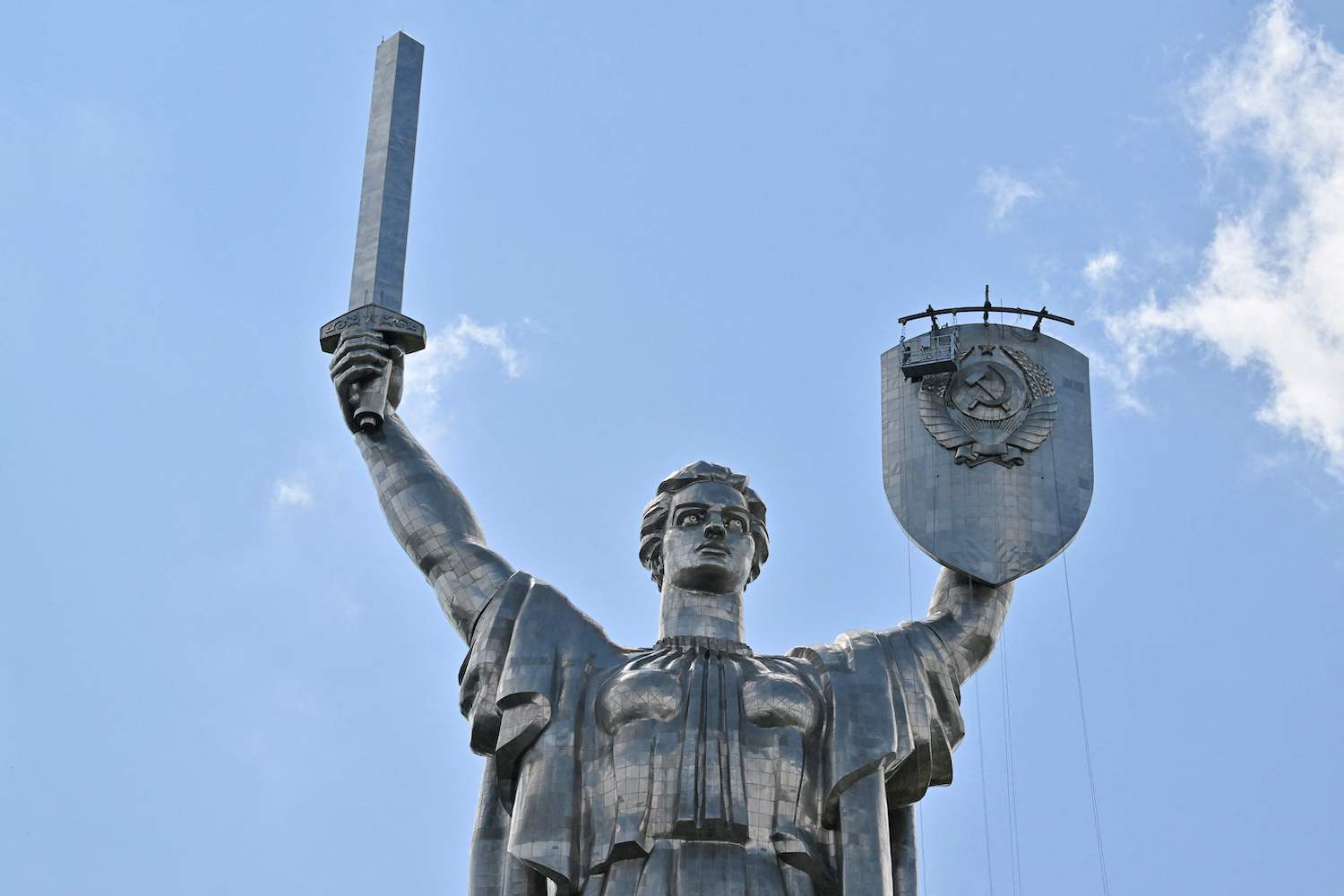
The Soviet coat of arms on the shield of a 62-meter Motherland Monument in Kyiv will be replaced with the coat of arms of Ukraine in accordance with the law on decommunization. (File/AFP)
Baklanov dismissed the deal as “fraudulent,” claiming that the majority of the grain had in fact been destined for Europe, not to food-insecure countries in Africa, and that Russian farmers were not benefiting from the arrangement.
“Only 3 percent of the grain went to the African continent and to the people that are suffering from hunger. The absolute majority of the grain went to prosperous countries of the West, especially European countries,” he added.
Claiming that only “half of the deal” was being recognized, he said no progress was visible on a related agreement designed to ease Russian food and agricultural exports amid Western sanctions imposed on Moscow in response to the Ukraine invasion.
On the Ukraine war, Baklanov noted that peace talks would not be on the table even though Russia was “very much thankful for the Arab countries and Saudi Arabia for their attempts to mediate.”

Aerial view shows destroyed buildings as a result of intense fighting, amid the Russian invasion, in Bakhmut, Ukraine in this still image from handout video. (File/AFP)
Close to 300 prisoners were exchanged between Ukraine and Russia in a deal brokered by Saudi and Turkiye in September. Both sides had captured hundreds of enemy fighters since the war between Russia and Ukraine broke out on Feb. 24, 2022, but only a few prisoner exchanges had occurred since.
Baklanov pointed out that mediation could be very helpful but only as far as some “humanitarian aspects” were concerned, such as exchange of prisoners of war.
“But the origin of the war is something which our colleagues in Arab and Africans countries should understand better. It’s necessary to feel the history — not just to know the history, but to feel the history.
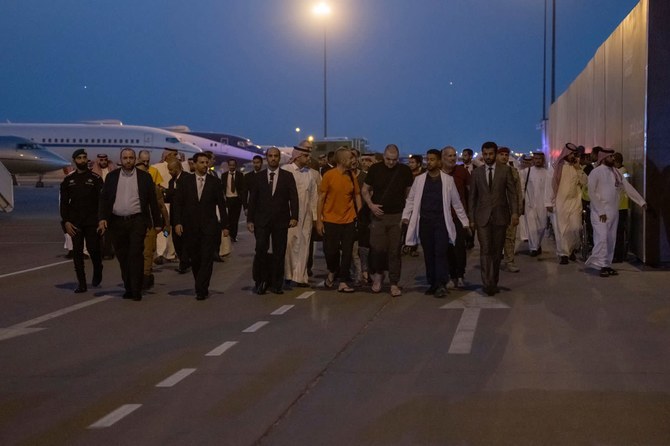
Prisoners of war are seen on the tarmac after arriving, following successful mediation efforts by Saudi Arabia, from Russia to King Khalid International Airport, in Riyadh. (File/SPA)
“It’s only those people — like me and some others — who understand the origin, the source, of this conflict. For the external people, it’s rather difficult to understand this origin in due manner.
“So, we are very thankful for these attempts to mediate but I think that, in real terms, this mediation can be helpful only for the humanitarian part,” he added.
Baklanov said he regretted that Russia had not started to coordinate its policies with Saudi Arabia earlier, especially regarding oil.
“Unfortunately, I must admit, for many years we didn’t give a clear-cut answer for the proposals of Saudi Arabia to make a common deal on this front. It was a grave mistake of the Soviet Union and the Russian Federation.
“But now, fortunately enough, we have this formal OPEC+, and I will say again that the initiative was from Saudi Arabia, and we backed that, and it was, for a long period of time, a really good gesture from the Russian Federation. Also, we value very much the initiative of Saudi Arabia to sacrifice their own interests,” he added.
He pointed out that from his experience there was “a big difference” between Soviet-era and Russian Federation policies.
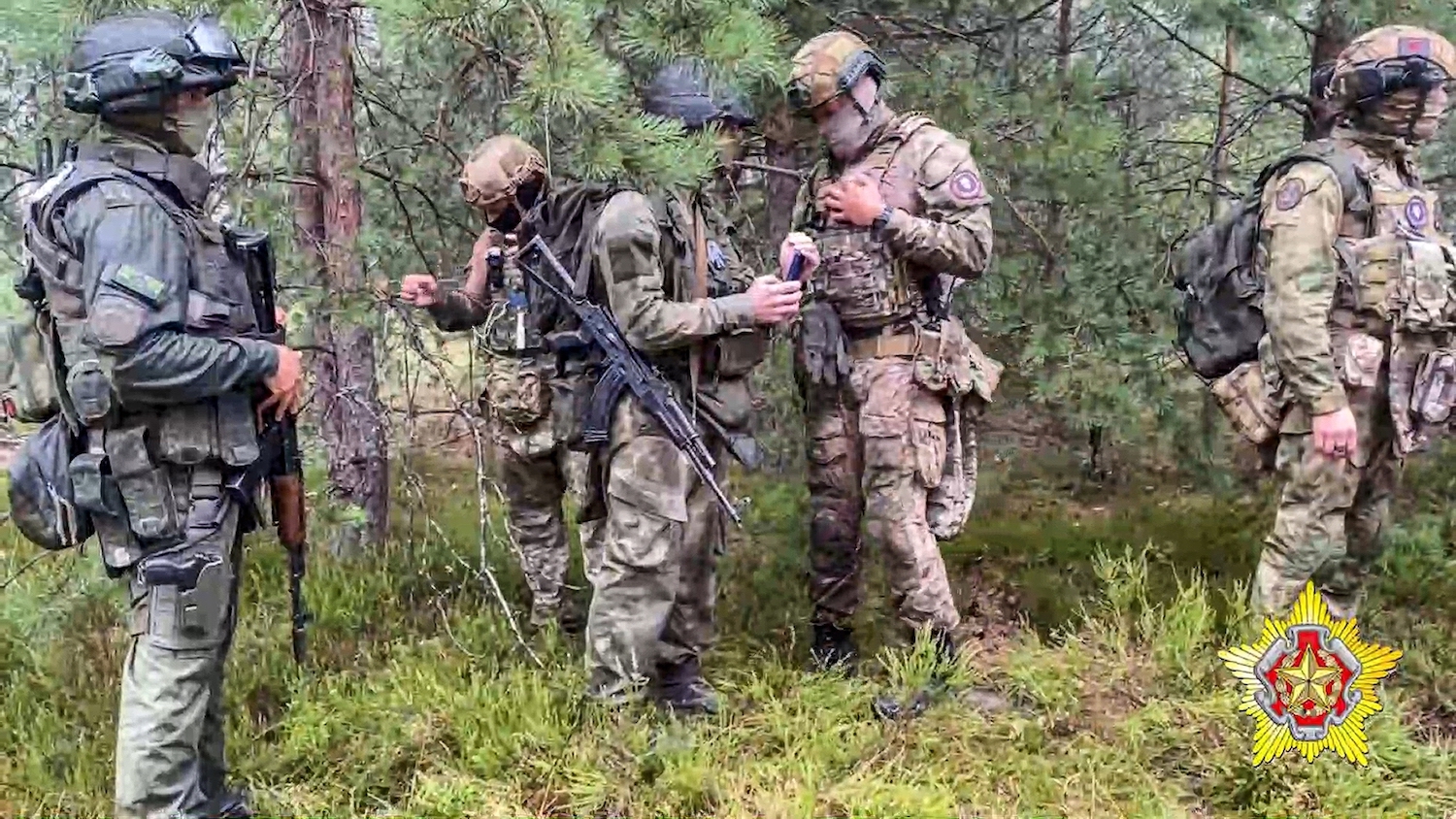
Belarusian soldiers of the Special Operations Forces and mercenary fighters from Wagner private military company attend the weeklong maneuvers conducted at a firing range near the city of Brest, Belarus. (File/AFP)
Baklanov said: “When I was for five years the ambassador in Saudi Arabia, I never asked the authorities of Saudi Arabia to make any (decisions) as far as their ties with the US were concerned. Never. We were speaking about our own interests. We had our bilateral interesting things to do.
“We do not (propagandize) against third countries. We criticize certain elements of policy when we see it, but we do not push these countries — the Gulf countries, Saudi Arabia — for anything against the interests of third countries.”
Praising the current state of relations between Saudi Arabia and Russia, he added: “It’s easier to be in good relations with us, to be on equal footing with us, to be on friendly footing with the Russian Federation. And we do not urge other people to be on awkward (terms) with some other countries.
“That is the difference with the US, which is pressuring countries to participate in its sanctions against us. The approaches from our side and that from the Western countries are absolutely different.
“I think that the people of the Middle East know this difference, and they are more friendly toward us for knowing these facts.”
Given that Russia has welcomed the normalization of relations between Saudi Arabia and Iran achieved through a Chinese-brokered deal, the question naturally arises why Moscow did not play the role of honest broker itself considering its own close ties with Riyadh and Tehran.
Baklanov claimed that Russia was indeed ready to undertake mediation, admitting that he, as a specialist in Arab and Middle East countries, was “a little bit disillusioned that our Chinese friends turned out to be successful.”
Nevertheless, he said Russia was mainly interested in the result.
“If the good result of this mediation is the start of the returning to normal relations between Saudi Arabia and Iran, we are interested in that. If the Chinese attained this political diplomatic victory, we (simply) congratulate them (on this achievement).

Saudi Foreign Affairs Minister Prince Faisal bin Farhan, Chinese Foreign Minister Qin Gang (C), and Iran’s Foreign Minister Hossein Amir-Abdollahian (L) pose during a meeting in Beijing. (File/AFP)
“But, also, we are ready to go on the same path, so we are both in one boat. We are interested in (stabilization) and normalization of the situation in the whole region. And, recently, we again resumed our proposal for a regional security system arrangement,” he added.
Baklanov brushed aside the suggestion that China’s growing role in the Middle East was a threat to Russia’s influence as an alternative to a non-Western regional diplomatic power.
“We are seeing what is going on in the Middle East region from a different angle. We do not have disputes with China, and we are not striving for a monopolistic role there against the influence of China. No.”
He described Russia’s interest in the Middle East as a very simple one.
“We would like to have near our boundaries a good situation, tranquil (situation). And if we are (serving the cause of peace), it’s okay. If China is (serving the cause of peace), it’s also okay. The main aim for us is not to be the first in these diplomatic activities, but to have positive results,” he said.
























